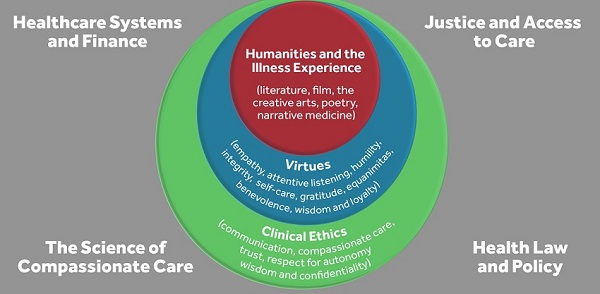Medical students form their professional identity during all four years of training, from the initial White Coat ceremony through the formal swearing of the Hippocratic Oath at graduation. The process of formation really pertains to a student’s very being: attitudes and biases, affective self-awareness, empathy, emotional intelligence, communicative skills, and virtues ranging from humility and diligence to altruism and self-care.
Stony Brook has from inception produced physician humanists who are empathically attentive to the illness experience of patients to complement their technological and scientific skills. Professional identity formation (PIF) refers to the growth over time in becoming a “good” physician.

We conceptualize PIF with three integrated concentric circles expanding outwards to form a trajectory for becoming effective humanistic physicians. The three elements have a natural order that helps students shape their professional identity while nurturing core values.
The process of professional identity formation (PIF) pertains to the medical student’s very being: attitudes and biases, affective self-awareness, empathy, emotional intelligence, communicative skills, and virtues ranging from humility and diligence to altruism and self-care. Stony Brook has from inception sought to produce physician humanists who are empathically attentive to the illness experience of patients to complement their technological and scientific skills. PIF refers to the growth over time in becoming a “good” physician. At the Renaissance School of Medicine at Stony Brook University (RSOM) medical students form their professional identity during all four years of training from the initial White Coat ceremony at the beginning of year one through the formal oath of the Hippocratic Path at graduation.
The Renaissance School of Medicine has long been an innovator in preparing students to embrace their professional identity by acquiring the skills and knowledge to practice medicine with both humanistic and scientific excellence. Our focus on professional identity formation goes back to founding dean Dr. Edmund D. Pellegrino, MD. Pellegrino (1968-1973) was an acclaimed innovator in medical and interdisciplinary health science and clinical education with a focus on the virtue theory, medical humanities, as well as professional and clinical ethics. Subsequent deans, including Dr. Marvin Kuschner, continued to build on this legacy. Dean Jordan J. Cohen, MD (1988-1994) instituted the Medicine in Contemporary Society Course (MCS) that became a national model for professional formation, emphasizing medical humanism as the path to professional growth.*
The Stony Brook tradition of excellence in medical humanism and ethics received strong endorsement in 2011 when the Liaison Committee on Medical Education (LCME), upon completing its site visit to the medical school, identified our legacy of professional identity formation as one of several special institutional strengths and ongoing commitments: “The medical school has made a strong commitment to strengthening its emphasis on humanities, ethics, and professionalism” with “required coursework and focus on these subjects throughout the curriculum; and an ongoing assessment and tracking of professionalism, ethics, and personal values as one of the core domains in the school’s competency framework.” This curriculum continues to provide excellence for the development of humanist physicians and is a key element of the RSOM experience. Students enjoy exploring their professional development within the PIF curriculum by participating in required coursework, electives, narrative reflection, and organized clinical reflections during clerkships.